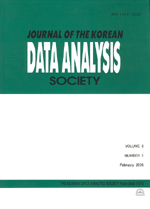한국 금융시장 장기기억 특성의 시간가변성
Time-varying Long Memory Property in the Korean Financial Markets
- 한국자료분석학회
- Journal of The Korean Data Analysis Society (JKDAS)
- Vol.13 No.5
-
2011.102561 - 2572 (12 pages)
- 8

본 연구의 목적은 금융시계열의 움직임에 장기기억이 존재하는지 여부가 분석기간에 따라 다른 결과를 나타낼 수 있는 시간가변적인 성격의 문제라는 것을 보이는 데 있다. 이를 위해 본 연구에서는 한국 주요 금융시장(KOSPI 및 KOSDAQ 주식시장, 원-달러 외환시장, 회사채시장)의 일별 수익률자료를 이용하여 R/S 분석에서 측정되는 허스트 지수를 표본이동분석법을 이용하여 추정하였다. 본 연구의 분석결과 한국 주요 금융시장에서 장기기억 특성의 정도에는 시간가변성이 분명하게 존재하였으며, 이러한 측면에서 금융시장 효율성의 정도도 역시 시간가변적이라는 것을 발견하였다. 이러한 측면은 장기기억 관련 실증연구에 많은 주의가 필요하다는 것을 의미하며, 장기기억 특성의 정도를 전체기간의 자료를 이용하여 정태적인 관점에서만 파악하는 것은 불충분하고 오해를 유발할 여지가 있다는 것을 의미한다. 최근 들어 한국 주요 금융시장 모두에서 허스트 지수가 크게 높아지고 있는데, 이는 국내 금융시장의 효율성이 현저히 악화되고 있다는 것을 시사한다.
This study examined long memory property in the dynamics of financial time series. The focus of it is whether the existence of long memory property has a time-varying feature. For this purpose, we estimated Hurst exponent of each time-window (about 4 years) using daily return series of four Korean financial markets (KOSPI and KOSDAQ stock markets, Won-Dollar foreign exchange market, and corporate bond market) by applying rolling sample approach to the R/S analysis. The main findings of our analysis are as follows. Firstly, the long memory properties of Korean financial markets are time-varying, implying that the efficiency of the markets is also time-varying. Secondly, recently the estimated values of the Hurst exponent are high and increasing, implying that the degree of efficiency of the markets is growing worse. Thus, it is necessary to prepare some policies which can enhance the efficiency of the Korean financial markets
1. 서론
2. 실증분석 표본자료
3. R/S 분석법과 허스트 지수
4. 실증분석 결과
5. 결론 및 시사점
참고문헌
(0)
(0)